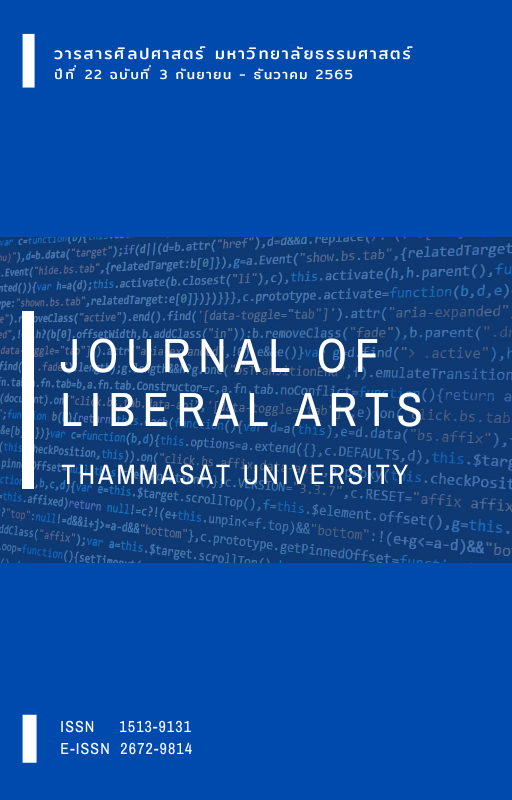การวิเคราะห์แนวคิดว่าด้วยชุมชนท้องถิ่นในฐานะพื้นที่ปฏิบัติการจริงของทฤษฎีการศึกษาเชิงวิพากษ์
Main Article Content
บทคัดย่อ
บทความวิจัยนี้มุ่งสำรวจองค์ความรู้ และวิเคราะห์เชิงวิพากษ์แนวคิดว่าด้วย “ชุมชนท้องถิ่น” และประเด็นที่เกี่ยวข้องกับอุดมการณ์ท้องถิ่นนิยมในฐานะพื้นที่ปฏิบัติการจริงของทฤษฎีการศึกษาเชิงวิพากษ์ ผู้เขียนใช้วิธีการวิจัยเอกสารผ่านการวิเคราะห์เนื้อหาตามกรอบแนวคิดชุมชนในฐานะที่เป็นพื้นที่ของการสื่อความหมาย ผลการวิจัยพบว่า นิยามความหมายของการศึกษาดำรงอยู่ผ่านกระบวนการช่วงชิงภายใต้พื้นที่และอาณาบริเวณของสถานที่ที่มีความเลื่อนไหล ส่งผลให้เกิดการทบทวนแนวคิดว่าด้วยชุมชนท้องถิ่นในฐานะที่เป็นพื้นที่ของการสื่อความหมาย และเป็นปฏิบัติการจริงของทฤษฎีการศึกษาเชิงวิพากษ์ ซึ่งจุดเปลี่ยนของ “พื้นที่” ทางการศึกษาจะนำไปสู่การนิยามความหมายของการศึกษาบนฐานชุมชนท้องถิ่นเชิงวิพากษ์เพื่อสร้างการปฏิรูปการศึกษาในบริบทพื้นที่ของสังคมร่วมสมัยอย่างเป็นรูปธรรม
Downloads
Article Details

อนุญาตภายใต้เงื่อนไข Creative Commons Attribution-NonCommercial-NoDerivatives 4.0 International License.
เอกสารอ้างอิง
กาญจนา แก้วเทพ. (2554). สื่อเก่า สื่อใหม่ ใจเชื่อมร้อย. ภาพพิมพ์.
ไชยรัตน์ เจริญสินโอฬาร. (2541). พื้นที่กับการพัฒนา. วารสารธรรมศาสตร์, 24, 16-18.
ไชยรัตน์ เจริญสินโอฬาร. (2549). วาทกรรมการพัฒนา: อำนาจ ความรู้ ความจริง เอกลักษณ์ และความเป็นอื่น. วิภาษา.
พัฒนา กิติอาษา. (2546). ท้องถิ่นนิยม. กองทุนอินทร์-สมเพื่อการวิจัยทางมานุษยวิทยา.
รุ้งนภา ยรรยงเกษมสุข. (2557). โลกาภิวัตน์ ท้องถิ่นนิยม กับการโหยหาอดีต. วารสารเศรษฐศาสตร์การเมืองบูรพา, 2(2), 1-15.
สุรเดช โชติอุดมพันธ์. (2562). The Spatial Turn: วิธีวิทยาการศึกษาพื้นที่ในวรรณกรรม. นววิถี: วิธีวิทยาร่วมสมัยในการศึกษาวรรณกรรม. สยามปริทัศน์.
สำนักงานเลขาธิการสภาการศึกษา. (2559). รูปแบบการจัดการศึกษาเชิงพื้นที่: บทเรียน ทางเลือก และเงื่อนไขความสำเร็จ. พริกหวานกราฟฟิค.
ออมสิน จตุพร. (2562). บทวิจารณ์หนังสือ Giroux, H. A. (2013). On Critical Pedagogy. วารสารศิลปศาสตร์ มหาวิทยาลัยธรรมศาสตร์, 19(1), 196-210. https://doi.org/10.14456/lartstu.2019.9
ออมสิน จตุพร. (2564). ภาคปฏิบัติการจริงของวาทกรรมการพัฒนาหลักสูตรท้องถิ่นในสถานศึกษาขั้นพื้นฐานของรัฐไทยสมัยใหม่. คณะศึกษาศาสตร์ มหาวิทยาลัยเชียงใหม่.
Appadurai, A. (1996). Modernity at large: Cultural dimensions of globalization. University of Minnesota Press.
Bell, A. C., & Russell, C. L. (1999). Life ties: Disrupting anthropocentrism in language arts education. In J. Robertson (Ed.). Teaching for a tolerant world: Grades K-6 essays and resources (pp. 68-89). National Council for Teachers of English.
Bellah, R. (1991). The good society. Alfred A. Knopf.
Bowers, C. (2008). Why a critical pedagogy of place is an oxymoron? Environmental Education Research, 14(3), 325-335.
Buckingham, D., & Sefton-Green, J. W. (1995). Cultural studies goes to school: Reading and teaching popular media. Taylor & Francis.
Cornbleth, C. (1990). Curriculum in context. Falmer Press.
Dimitriadis, G. (2001). Performing identity/performing culture: Hip hop as text, pedagogy, and lived practice. Peter Lang.
Dolby, N. (2001). Constructing race: Youth, identity and popular culture in South Africa. SUNY Press.
Englund, T. (2006). Introduction: Jurgen Habermas and Education. Journal of Curriculum Studies, 38(5), 499-501.
Fawcett, L., Bell, A. C., & Russell, C. L. (2002). Guiding our environment praxis: Teaching for social and environment justice. In W. Leal Filho (Ed.). Teaching sustainability at universities: Towards curriculum greening (pp. 223-38). Peter Lang Scientific Publishers.
Fien, J. (1993). Education for the environment: Critical curriculum theorizing and environmental education. Deakin University Press.
Geertz, C. (1973). The interpretation of cultures. Basic Books.
Giroux, H. A. (2004). Cultural studies, public pedagogy, and the responsibility of intellectuals. Communication and critical/cultural studies, 1(1), 59-79.
Giroux, H. A., & Simon, R. I. (1988). Schooling, popular culture, and a pedagogy of possibility. Journal of Education, 170(1), 9-26.
Gough, A. (1997). Education and the environment; Policy, trends and the problem of marginalization. Australian Council for Educational research.
Gruenewald, D. (2003). The best of both worlds: A critical pedagogy of place. Educational Researcher, 32(4), 3-12.
Gruenewald, D., & Smith, G. (2008). Place-based education in the global age: Local diversity. Taylor & Francis Group.
Gulson, K. N., & Symes, C. (2007). Knowing one’s place: educational theory, policy, and the spatial turn. Critical Studies in Education, 48(1), 97-110.
Habermas, J. (1987). The theory of communicative action, vol 2: Life-world and system: A critique of functionalist reason. Polity Press.
Habermas, J. (1989). Structural transformations of the public sphere. MIT Press.
Hargreaves, A. (1994). Changing teachers, changing times: Teachers’ work and culture in the postmodern age. Teachers College Press.
Huckle, J. (1991). Education for sustainability: Pathways to the future. Australian Journal of Environmental Education, 7, 49-69.
Huckle, J. (2008). An analysis of New Labor’s policy on education for sustainable development with particular reference to socially critical approaches. Environmental Education Research, 14(1), 65-75.
Larsen, M. A., & Beech, J. (2014). Spatial theorizing in comparative and international education research. Comparative Education Review, 58(2), 191-214.
Leopard, D. (2013). Teaching with the screen: Pedagogy, agency, and media culture. Routledge.
Lousley, C. (1999). (De)politicizing the environment club: Environmental discourses and the culture of schooling. Environmental Education Research, 5(3), 293-302.
Louv, R. (2005). Last child in the woods: saving our children from nature deficit disorder. Algonquin Books.
Middleton, S. (2010). Labourers’ letters from Wellington to Surrey, 1840-1845: Lefebvre, Bernstein and pedagogies of appropriation. History of Education, 39(4), 459-479.
Pepper, D. (1989). Red and green, educational perspectives. In D. Randle (Ed.). Teaching green (pp. 85-91). Green Print.
Popkewitz, T. (1991). A political sociology of educational reform: Power/knowledge in teaching, teacher education, and research. Teachers College Press.
Resor, C. W. (2010). Place-based education: What is its place in the social studies classroom?. The Social Studies, 101(5), 185-188.
Scott, W., & Gough, S. (2003). Sustainable development and learning: Framing the issues. Routledge Falmer.
Smith, G. (2007). Place-based education: Breaking through the constraining regularities of public school. Environmental Education Research, 13(2), 171-188.
Soja, E. W. (1996). Third space: Journeys to Los Angeles and other real-and-imagined places. Blackwell.
Stevenson, R. (1993). Becoming compatible: Curriculum and environmental thought. Journal of Environmental Education, 24(2), 4-9.
Thompson, P. (2006). Miners, diggers, ferals and show-men; School-community projects that affirm and unsettle identities and place?. British Journal of Sociology of Education, 27(1), 81-96.
Vare, P., & Scott, W. (2007). Learning for a change: Exploring the relationship between education and sustainable development. Journal of Education for Sustainable Development, 1(2), 197-98.
Watson, J. (2008). Cultural globalization. Encyclopedia Britannica. Encyclopedia Britannica Online. http://www.britannica.com/eb/article-225000
Weis, L., & Dimitriadis, G. (2008). Dueling banjos: Shifting economic and cultural contexts in the lives of youth. Teachers College Record, 110(10), 2290-2316.
Wiseman, J. (1999). Global nation? Australia and the politics of globalization. Cambridge University Press.


